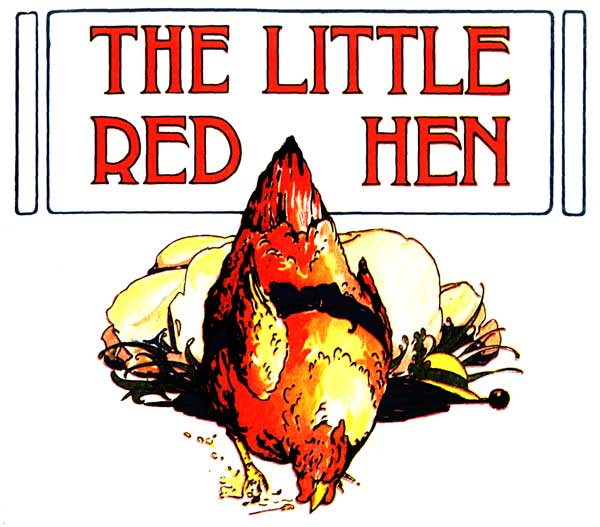The Little Red Hen Method for Fighting COVID

Tenants in public and subsidized housing for elderly and disabled, as well as market rate and affordable housing, are vulnerable to an outbreak of COVID-19. Once COVID-19 gets into such a setting, it can spread like wildfire. Prevention involves watching for the first signs of disease as well as ongoing measures to protect everyone from getting infected.
We are the elderly and the disabled, we are the tenants, the family, the friends, the landlords, managers, and the workers who populate housing developments. We must work together to protect ourselves because no one else wants to do it.
To stop an infectious disease like COVID-19, we need to know where it is.
No agency is looking, no agency is guiding landlords and tenants. Like the Little Red Hen, it is up to us. We'll do it. Let's do the survey!
“Without testing, there’s no way of knowing how many people have the virus,” said Michael Kane, executive director of the National Alliance of HUD Tenants. “Our concern is that there could be a transmission danger similar to what’s going on in nursing homes or assisted living.”
The lack of timely, site-specific information coupled with resistance and barriers to gathering and distributing this information, demonstrates a callous disregard for the health and well-being of management, staff, and tenants alike.
A new law mandates managers of elderly/disabled multifamily housing facilities to report, and for the Department of Public Health to publish facilities with cases of COVID-19. (Acts/2020/Chapter93)
But the Governor and the Department of Public Health have failed to implement the reporting requirements of the law covering housing for the elderly and disabled.
The first step is to gather facts. Let’s get started by taking the Little Red Hen COVID-19 survey!
- Is COVID-19 found in your housing development?
- Which housing developments have people sick or dying from COVID-19?
- Which housing developments do not have people sick or dying from COVID-19?
- What is working well to protect us, and what is failing to protect us?
- Who is working to protect us, and who is failing to protect us?
A fable for our times
I'm reminded of the story of "The Little Red Hen," a folk tale recorded by Mary Mapes Dodge. The little red hen was very busy finding food for her family, and decided to grow wheat and make bread to help her feed her family. She was so busy that she asked the pig, the cat, and the rat to help. But they wouldn't help, and she went ahead and did it herself. Do you remember the story?
The Little Red Hen called loudly:
“Who will plant the Seed?”
But the Pig said, “Not I,” and the Cat said, “Not I,” and the Rat said, “Not I.”
“Well, then,” said the Little Red Hen, “I will.”
And she did.
In the story, the little red hen ends up doing everything---the planting, the harvesting, the milling, the baking...and the eating.
Let's not wait for others to protect us from COVID-19; let's be like the little red hen. The difference, however, is that everyone will benefit from our efforts.
Will you join our effort? I hope you will!
We need to work together to resolve this problem. Let’s get started by taking the Little Red Hen COVID-19 survey!
Stop Hiding the Data!
There is good information being collected by the Department of Public Health, but it is not allowed to be published and used to protect us. The Commissioner of Public Health has decreed that a local health department may only identity the infected persons to first responders.
We need reliable information based on testing and collection of data on COVID-related illness and death. Surveillance—looking for cases of infection—is a keystone of public health.
...Successful prevention and control of infectious diseases is built on a foundation of disease surveillance. Surveillance shows what diseases are happening, where they are taking place, and who is getting them. Surveillance data can also show how effective our efforts are in controlling disease. — Mass Department of Public Health
We have looked high and low for answers and to seek action. We have gone to our legislators on Beacon Hill including an open letter to the Joint Committee on Public Health, Public Health departments, two open letters to the Governor, leaders of public housing, even agencies that advocate for tenants.
Legislators did pass a law to require reporting and publication of COVID-19 cases in elder/disabled facilities, but the Governor, the Department of Public Health, and many in housing leadership (officials, leaders of advocacy groups) are seeking to eliminate that process for housing. The Governor and others have proposed new legislation, (An Act to ensure the collection of COVID-19 data https://malegislature.gov/Bills/191/S2840) that is actually an effort to prevent the collection and distribution of information.
We have proposed how to amend the law to enable the timely use of existing public health data. The legislature should enable the Department of Public Health to collect information from a variety of other sources, thus relieving landlords while providing the surveillance information. And the data should then be made available in a timely fashion by public health departments to landlords, staff, and to all tenants to guide remedial and preventive actions.
- Log in to post comments
